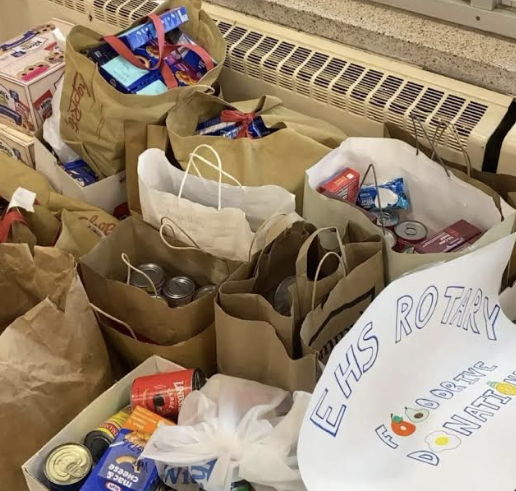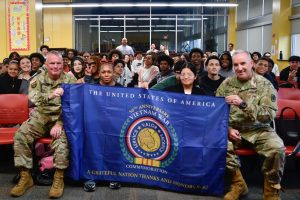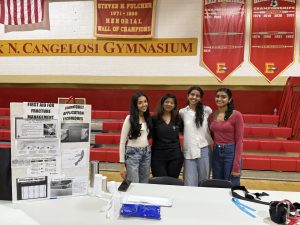My Mom is My Superhero

April 28, 2021
Today is National Superhero Day and for many people, their mothers or stepmothers are their superheroes. Over the past few weeks, I’ve spoken to five mothers about their experiences during the pandemic, hoping to get some insight into the strongest humans we know. Their careers vary widely– three teachers, a realtor, and a legal consultant– yet they have all seen their lives affected by COVID-19.
This past year, nearly 3 million American women have left the workforce, forced out due to coronavirus-induced issues ranging from pay inequality, to undervalued work, to the trivialization of at-home care. Because these numbers continue to grow, I am interested in some of the mothers surrounding me, who’ve defied the statistics and managed to remain in the workforce.
I sit down and open the Zoom call. On the other end is history teacher Ms. Jennifer Sidorski, my first interviewee. She has just arrived home from a short jog and apologizes for it. After a few introductory questions, I learn that Ms. Sidorski has two kids, Avery and Jordan. Both are in pre-k and go to daycare on a daily basis. Because of the pandemic, she had to pull them from extracurricular activities, but says she hopes they will resume once it becomes safer. One of the hardest parts of the pandemic is juggling teaching students while her own children are home. Ms. Sidorski tells me it is definitely stressful, and “the moving parts” made it even more difficult, but she compliments her children and their resilient personalities that make the situation easier.
The most important question I ask all these moms is about their mental health. “How do you relax? How do you destress from your daily life?” Ms. Sidorski brings me back to her apology, telling me jogging, picking up physical activity again, and spending twenty to thirty minutes exercising each day is the best way she can destress.
“I don’t have a Peloton, but I have the Peloton app,” Ms. Sidorski says. “ I’m sure you’ve heard of it,” she elaborates with a laugh. Her commitment is commendable, because exercise definitely isn’t my own forte. To end, we discussed the history of women in the workforce; historically, we note, when times get hard, women must leave their work and their careers to take care of their children. She hopes in the future these conditions change, but for now, she says, “moms during the pandemic have definitely been ignored a little bit… no one’s really talking about it… so if you know a mom friend with little kids, check on them.”
Later, in the Media Center, I talked to math teacher Ms. Lynn Harris. Her experience in the pandemic has been vastly different from Ms. Sidorski’s experience. She attributes this to her older children: middle schooler Noah and high school senior Gabe. She tells me that “since they’re older, I don’t think it was quite as difficult… when the kids are older, they’re a little more independent.” Both sons play sports and have been very involved in lacrosse and school activities this past fall. Ms. Harris also volunteers with Edison High sports.
Balancing both areas of responsibility has been stressful for Ms. Harris, so I ask her about her relaxation techniques. “I go to Crossfit every morning at 5 am… I get up at 4:30 because that’s the only time that I can fit that in, so I make sure I go work out every day. Otherwise mentally, [I] don’t destress, don’t get a break.” Her routine seems to provide her solace from the hustle of the rest of the day.
I almost forgot to ask Ms. Harris about her experience teaching at home this past year while her own children learn from home. She definitely agrees that it started off hard, but because her children are old enough, they each study from different rooms, with herself in her dining room. This dynamic is common for many families during the pandemic: at least one parent at home while their children are learning from separate rooms.
Finally, we discuss what we’ve taken from this pandemic. Especially Ms. Harris, whose son leaves for college soon. She has maintained a positive attitude on the difficulties of the last year, telling me, “in general though, the pandemic was important in getting everyone to slow down and I was happy to spend time with the kids at home.”
As I interviewed these moms, I realized how vastly different yet strangely similar their experiences have been. Despite every hardship, each woman has brought something positive out of this situation.
To change it up, I talked to Ms. Kinnari Raval, a local real estate agent. She has two children in the Edison school system, Keya and Sai. Ms. Raval has spent the past year flipping between working from home and her office. She acknowledges her luck in having a job in which she is able to stay home. She says, “I don’t have to report to anybody, or report to my office, so… regularly I can still be home and work.”
Often during our interview, Ms. Raval mentions distractions, telling me how detrimental they’ve been to home life. For both her kids, and herself, “you just have too much distraction,” she says, regarding the downsides of working from home and, for her kids, studying at home. Her children are involved in many different after-school activities, and we talk about how this has affected her daily life.
She tells me, “as a mother, you are always on your toes. If I have to do certain things, I have to find time.” This sentiment certainly rings true with many parents and mothers.
At one point, Ms. Raval begins to yawn, echoing her words and signaling her exhaustion. It is 8 p.m., and it is clear that the hustle of the day has taken its toll. I make sure to ask what Ms. Raval has gotten out of this pandemic, the positives in this otherwise negative situation. Simply put, she says, “we have to be thankful.” Because her husband travels often, Ms. Raval makes it clear she has appreciated the increased time spent with her family. Finally, I ask her about her methods to destress, how she, as a mother, takes care of herself. Ms. Raval tells me it’s all in her routine. By having a set sleep schedule, and a daily routine, she’s managed to become comfortable with her day and reduce her worries.
I talked to English teacher Ms. Diane Frey as well, beginning the conversation acknowledging her children; twin boys, Landon and Grant, and her teenage daughter, Keira. The kids chatter in the background, the two youngest vehemently denying most of what Ms. Frey says. Teaching from home is obviously difficult on its own, but coupled with three children learning from the same house is even more of a challenge. It was interesting to hear how Ms. Frey juggles it all.
“The boys needed more help… so I was helping them a lot more… last year they were doing a lot of writing… so that was hard to balance,” she says, as one son shakes his head in the background, denying the accusations. This struggle to keep a balance has been a common theme throughout, and so having a way to destress is truly important. Ms. Frey’s habit parallels that of many of the moms I interviewed. “I’m a mover,” she says. “I have to move my body, I go for runs, I play on a soccer team. Those are priorities.”
Ms. Frey echoes the sentiments of each mom before her, emphasizing the power of the past year to bring her family closer. “It’s definitely been good for our relationship just to have Keira around a little bit more than she would’ve in a regular high school year,” she says.
Finally, I spoke to Ms. Gayitri Chandiramani, a legal consultant, with three children in Edison schools. As a legal consultant, Ms. Chandiramani “manage[s] intellectual property portfolios for four different pharmaceutical companies.” She is able to do this job from home, but the most difficult part is handling her three young children as well. Her three daughters, Tara, 12, Ava, 9, and Leah, 8, are all at home most days, pulled from swimming, their main extracurricular, due to scheduling issues and Covid-19 concerns.
Ms. Chandiramani has had relative success with her children this past year, and she attributes this success to their daily routine, while also acknowledging their “crazy mornings.” She tells me, “we’ve definitely created a massive routine… Without a morning wakeup routine…we would’ve never survived. We kept up with the day-to-day, pretending they were actually going to school.” This structure has helped keep her family’s mornings and days organized. Although, when Ms. Chandiramani tells me this routine of hers, I almost become overwhelmed myself, the amount of steps surprising me. To end the interview, I ask her about her personal relaxation techniques. “Primarily, it’s me getting my workout in… the one/one and a half hour I spend to myself are very important… Just generally, getting my personal self taken care of really helps destress the situation.”
The experiences of these mothers are not unique to time or place; they parallel countless others all around the world. Every day, mothers manage to balance their home and work lives, taking on the responsibility of both–as my own mother has. It would be inconsiderate of me if I didn’t say thank you to my own mother, who has helped me throughout this pandemic, and who is truly, my own superhero.
It’s National Superhero Day and at The Eagle’s Eye, moms are our superheroes. Pandemic or not, they work hard for us, and they truly don’t get enough credit for all that they do.






















































































